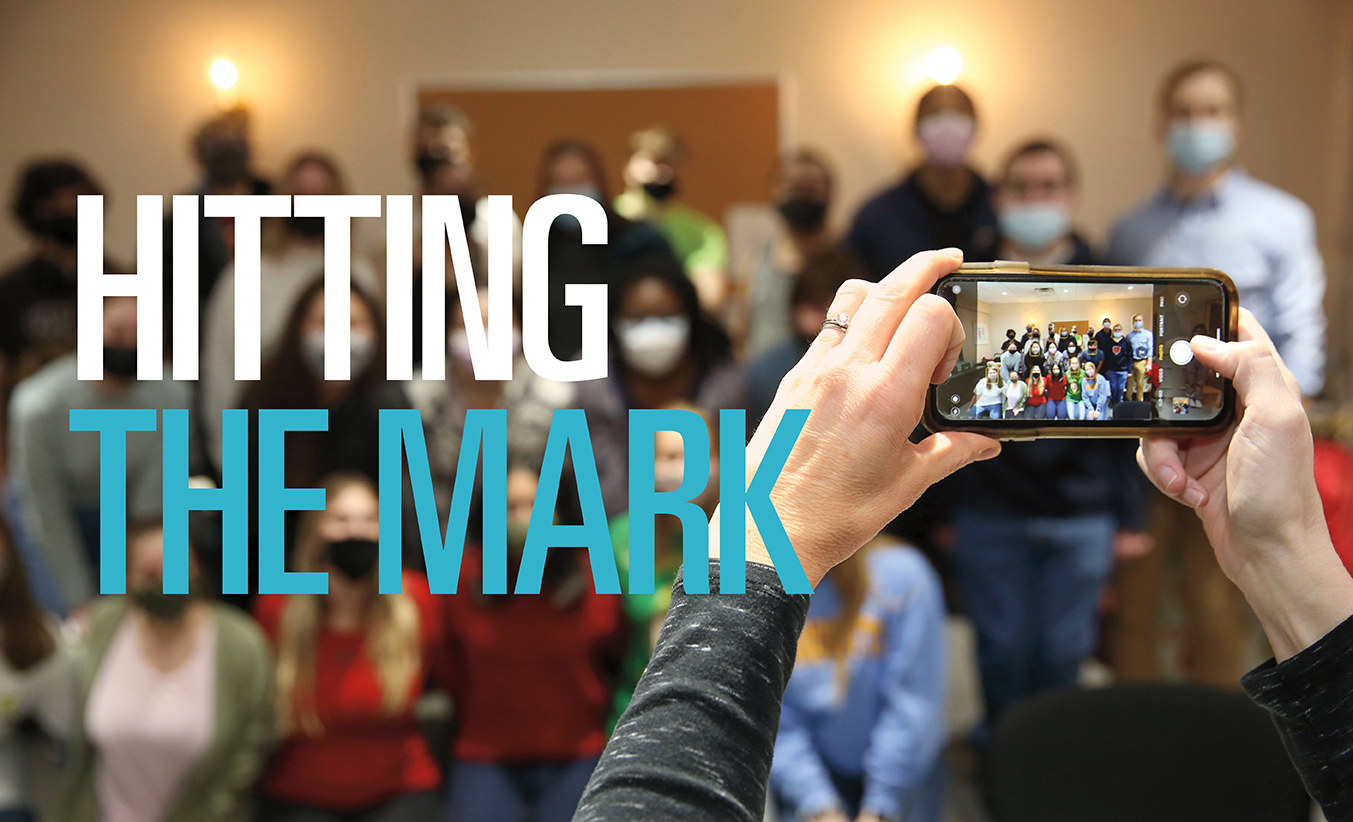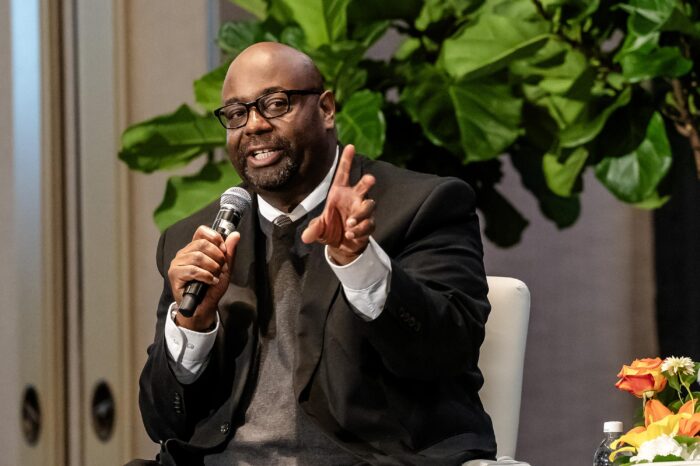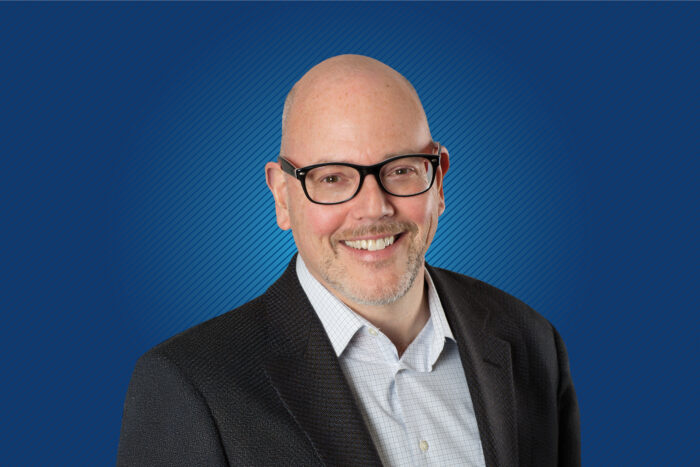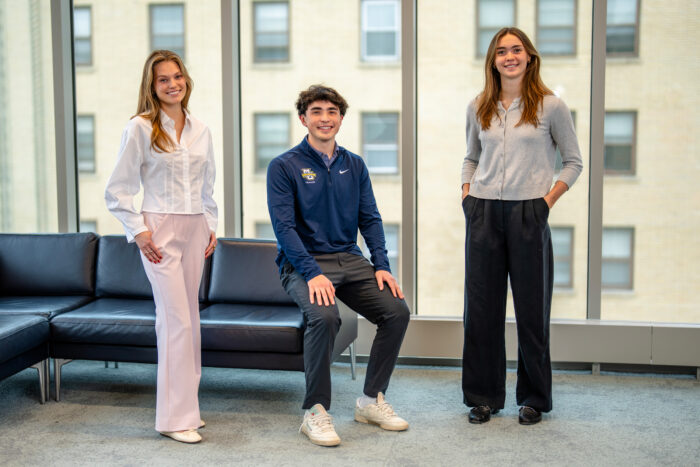It’s the first week of final exams and about 35 students — all wearing masks — gather around a U-shaped conference table to decorate gingerbread houses. Laughter and holiday music soften the office-bright lighting. In the back of the room, the comforting smell of pepperoni and cheese rises from a dozen pizza boxes stacked on a table.
“I think it’s great that we’re doing this, especially during finals when people are lonely,” says sophomore Ben Jennings. “We need to get together and just relax.”
Stress and isolation are difficult for anybody, but for the one person in 44 in the U.S. living with autism spectrum disorder, Jennings among them, coping with college can be particularly challenging. Autism affects the brain’s early development of social and communication skills. Although students on the spectrum often possess strong intellectual capabilities, they must overcome other obstacles standing in the way of their academic progress, such as difficulty managing time, staying organized and studying effectively.
“Only about 41 percent of individuals with a disability, including ASD, graduate,” says Dr. Amy Van Hecke, professor of psychology. For those without a disability, the U.S. graduation rate is about 60 percent.
Seeing an opportunity to meet a glaring educational need, Van Hecke teamed with Dr. Mary Carlson, Grad ’16, clinical associate professor of educational policy and leadership, and Wendy Krueger, Grad ’92, clinical associate professor of speech pathology and audiology, to establish a set of strategies to help neurodivergent students manage college. With funding from donors, they created the On Your Marq program, which launched in 2019. Its web of support includes the program’s director, Emily Raclaw, her support dog, Raven, and a host of peer mentors and academic and mental health coaches who assist autistic students in building their academic, social and professional skills. Three years in, the program has 17 students enrolled, with 11 new applicants pending for the fall. Members of the first cohort
are set to graduate late this spring.
“This is about cura personalis. This is about recruiting a population of students who might not come here otherwise. It’s about academic excellence, supporting them in their careers, so they graduate on time and go on to live fulfilling lives,” Van Hecke says.
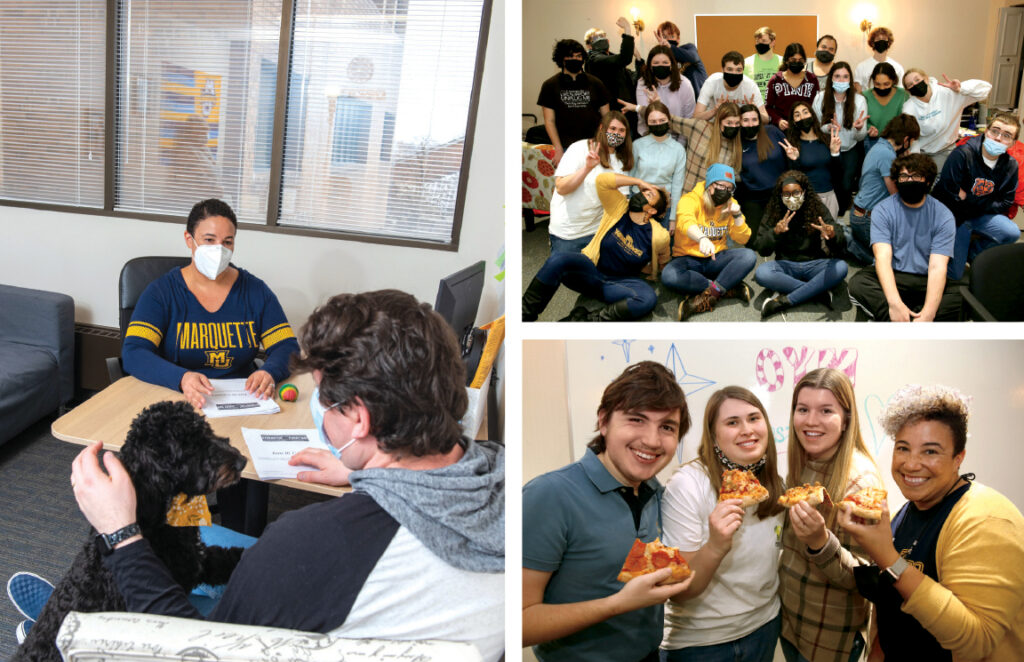
Web of support: On Your Marq Program Director Emily Raclaw (above, at desk and far right) says her personal experience with neurodivergence helps her relate to her students.
Late in 2018, Dr. Sarah Wadsworth, professor of English at Marquette, started to worry about how her son, Blaise Black, who is autistic, was going to successfully manage living on a busy college campus. He was a junior in a suburban Milwaukee high school and although he excelled academically, he was showing signs of stress from the environmental and organizational aspects of school and seemed reluctant to contemplate post-secondary options.
Then Wadsworth read an article in a Marquette newsletter that Van Hecke, Carlson and Krueger were launching On Your Marq. “It changed my whole outlook,” says Wadsworth.
The program was funded with a gift from John, Arts ’64, and Kate Miller, who had a young family member on the spectrum and were concerned about the child’s prospects for college. In their search for a director, Van Hecke, Carlson and Krueger were independently impressed with Raclaw. Her own experience living with attention deficit hyperactivity disorder combined with her expertise creating college programs for disability, diversity and neurodiversity education made her an ideal candidate. “She’s a force to be reckoned with, and that’s what we need,” Van Hecke says.
Black, Wadworth’s son, was among the first cohort of five students to sign up in 2019. Like all On Your Marq participants, he was assigned a peer mentor and a graduate coach from one of Marquette’s psychology, counseling or occupational therapy programs. Graduate coaches work one-on-one with students to create individualized plans for managing academics, social life and independent living. Peer mentors help the students execute those plans. Mentors also organize events, such as football- or movie-watching parties and video game tournaments. And they provide tips on navigating relationships and social interactions.
“I imagine that if I had not joined the program, I would be quite lost with regards to the goings-on
on campus. I would probably only focus on my work and nothing else. In reality, I am a lot more aware of events I might want to participate in,” says Black, now a junior double majoring in math and computer science who was recently admitted to the Accelerated Degree Program in computing, which will allow him to earn a master’s in one year.
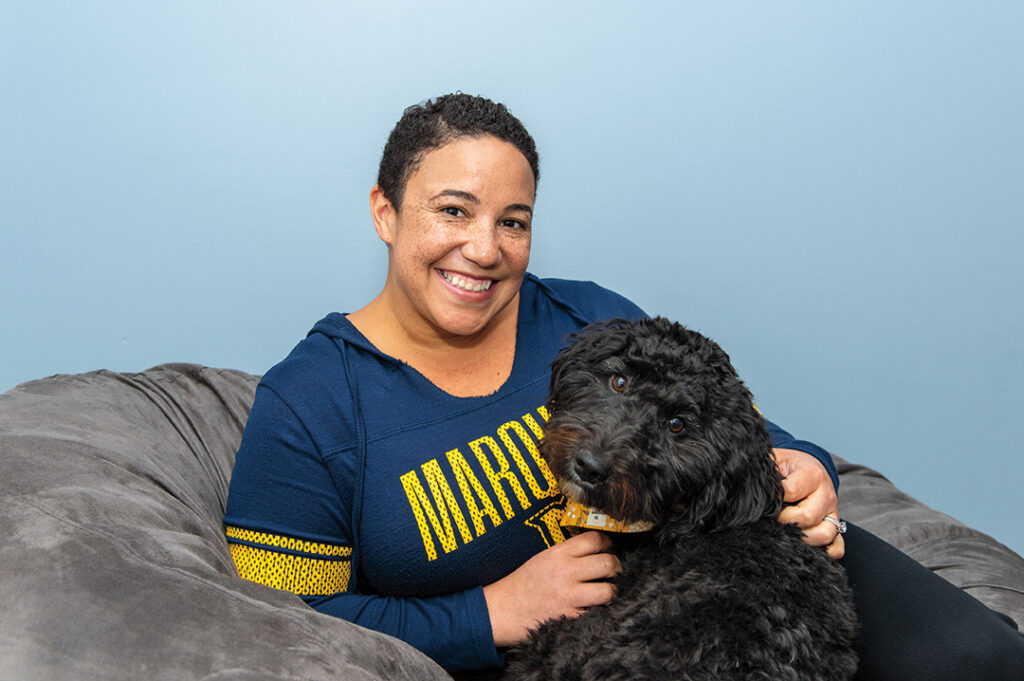
Paws that refresh: Raven, the therapy dog, works as the program’s ambassador of wags. Photo by Kalida Williams.
Raclaw is probably the only staff or faculty member in Coughlin Hall — or maybe all of campus — with a dog crate in her office. It’s for her certified therapy dog, Raven, an Aussiedoodle (part Australian shepherd, part poodle) that turned 1 year old in February. Raclaw calls Raven her ambassador. “She’s just a great conversation starter,” says Raclaw. Students come to visit Raven and, in the process, meet other students in a way that feels natural, she says.
Raclaw says she can relate to her neuro-divergent students. To manage her ADHD, she too has adopted specific strategies that help her succeed. For instance, she watches videos online at twice the normal speed and answers emails immediately, so they don’t fade into the background of her day. She understands that the world isn’t necessarily built for how autistic people process information, but she hopes to create one in Coughlin Hall that is.
There’s a room next to her office with a couch, several comfy chairs, a TV and Nintendo Switch. Down the hall, an open space invites studying. A sensory room nearby has tactile wall art and heavy window shades that darken the space, both designed to soothe anyone feeling overstimulated.
Raclaw has also partnered across campus to establish a network of services. Staff in the Norman H. Ott Memorial Writing Center created a script for students to use when requesting assistance. The Office of Residence Life automatically reassigns sophomores the same room they had as freshmen. The Office of Student Educational Services substitutes one-to-one tutoring for group sessions. Marquette’s Occupational Therapy Department and rehab counseling program offer seminars that teach students how to cook, do laundry and clean.
“I’m incredibly proud of how Marquette has fully embraced On Your Marq,” says Raclaw.
Freshmen and sophomores get more support as they learn how to transition from high school to college. They’re coached on how to ask questions and find answers, how to communicate their needs. They learn to advocate for themselves. Juniors and seniors receive less support as they move from college to career. Through courses designed to reveal potential job interests and practice with resume writing and interviews, students begin to imagine themselves in the workplace.
Ideally, the students continue to grow and persevere after graduation, using the strategies they’ve learned to communicate their needs and “get what they need in their life,” Raclaw says. “I hope more than anything else that they are happy and satisfied with the experience they had at Marquette and are excited about what the future holds for them.”

